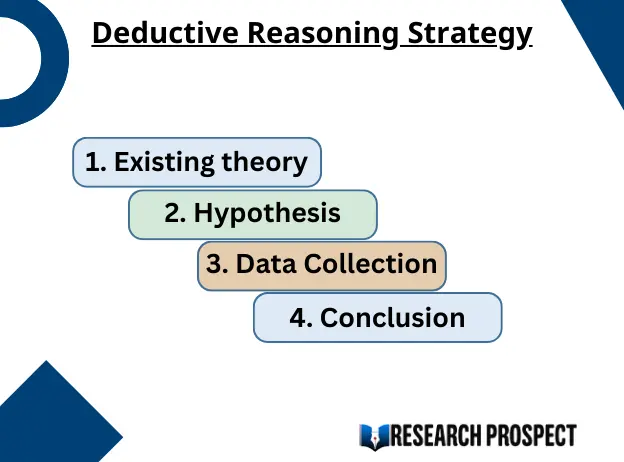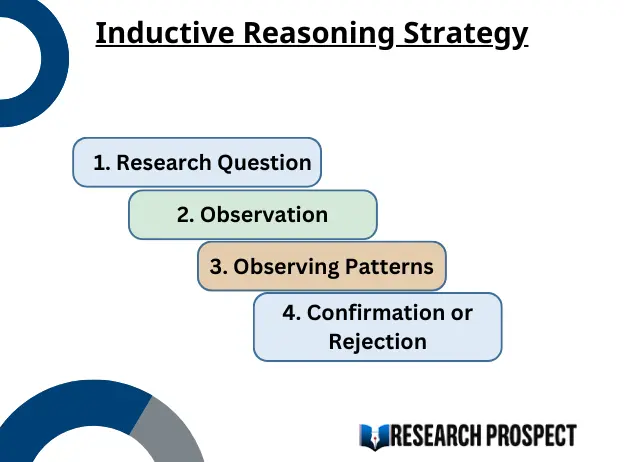Inductive and Deductive Reasoning – Examples & Limitations
Published by at August 14th, 2021 , Revised On October 26, 2023
“Deductive reasoning is the procedure for utilising the given information. On the other hand, Inductive reasoning is the procedure of achieving it.” Henry Mayhew. Inductive and deductive reasoning takes into account assumptions and incidents. Here is all you need to know about inductive vs deductive reasoning.
Deductive reasoning begins with an assumption and moves from generalised instances to a certain conclusion. On the other hand, inductive reasoning begins with a conclusion and moves from certain incidents to a generalised conclusion.
Deductive Reasoning Strategy
The deductive reasoning method starts with a theory-driven hypothesis that directs data collection and investigation.
If there is an existing theory to explain a specific topic, you form a hypothesis based on that theory that guides data collection and analysis. You might design a particular survey to collect information about a set of variables in your hypothesis which you then evaluate.
1. Existing theory
- All mangoes are fruits (general statement)
- All dancers know how to sing. (general statement)
2. Hypothesis
- All fruits have seeds (general statement)
- Seems knows how to sing (general statement)
3. Data Collection
- Collect different types of fruits to see if they have seeds.
- Collect information about singers and dancers to know how many of them can dance and sing?
4. Conclusion
- Mangoes have seeds (specific conclusion/confirmation)
- Hence, Seema is a dancer. (Rejection)
Limitations of Deductive Reasoning
Deductive reasoning considers no other evidence except the given premises. The conclusion is drawn based on proof. The basic premise needs to be true to draw a positive conclusion about the theory.
Example
- All mangoes are fruits. (Premise)
- All fruits have seeds. (Premise)
- Mangoes have seeds. (Conclusion)
From the first and second premise in the above example, the third statement is concluded.
Does your Research Methodology Have the Following?
- Great Research/Sources
- Perfect Language
- Accurate Sources
If not, we can help. Our panel of experts makes sure to keep the 3 pillars of Research Methodology strong.

Inductive Reasoning Strategy
The inductive reasoning method starts with a research-based question and data collection to develop a hypothesis and theory.
If you have a research question that is a testable concept, you proceed with data collection about the connection between two or more observations. Based on those observations, you form a hypothesis which you use to evaluate and develop a theory.
1. Research Question
- Does regular exercise promote maximum weight loss?
- Are all cats brown?
2. Observation
- Regular exercise enables maximum weight loss.
- All cats in this area are brown.
3. Observing Patterns
- You might begin by collecting relevant data from a group of individuals. Try to understand their views, experiences through conducting surveys and interviews.
- You can examine cats from different areas to find out if all of them are brown?
4. Confirmation or Rejection
- Regular exercise promotes maximum weight loss if it is incorporated with a balanced diet and a healthy lifestyle.
- All cats in this particular area are brown, but all cats are not generally brown.
Limitations of Inductive Reasoning
Inductive reasoning may be logically true but may or may not be realistically true. Your consequences are likely to be wrong.
Example
Suppose we take an example of a fruit basket and pick up two raw fruits and assume that all fruits in the basket are raw. It might be apparently true but may not be logically true because there might be ripe fruits along with the raw fruits.
Inductive Vs. Deductive Reasoning Comparative Analysis
- Inductive reasoning is the generalised conclusion based on general knowledge by observing a specific outcome. These observations may change or remain constant. It may be logically true or may not be true.
- Deductive reasoning may seem simple but it can go wrong if the given premise is wrong. However, deductive reasoning concludes based on the given premises and proofs. It is important to implement the logic properly otherwise the entire process of reasoning and its conclusion will be wrong.
- We use inductive and deductive reasoning in everyday life. We develop beliefs based on our experiences. Both types of reasoning depend on evidence. It helps to get close to the truth.
- “Never join a group of book burners. You can merely hide evidence, but you can’t suppress the existing truth.” Dwight D. Eisenhower
- One of the main differences between these two methods is that the conclusion may not be logical and may change. The outcome can be strong or weak but not entirely true or false.
- We get a new piece of information in the inductive reasoning approach based on the other available information. On the other hand, we don’t get a new piece of information as we already have an existing fact.
- In deductive reasoning, we already know that our basic information is a fact, and it leads to a new outcome which may be another fact. Whereas in inductive reasoning, the basic information is a hypothesis, and it may sometimes lead to a false conclusion.
- Inductive reasoning and deductive reasoning depend on the facts and evidence, the search for truth, which can be accepted or rejected. Lawyers and Scientists use facts followed by evidence to prove their statements. However, we can predict the situation based on the collected information, but no one can prove what happened exactly in the past without any strong proof. Example – Arthur Canon Doyle made inductive reasoning prominent. One of his iconic characters ‘Sherlock Holmes’ uses an inductive reasoning approach in his investigations in the quest for truth, which may or may not support a specific incident.
- Superstitious beliefs are inductive. For instance, it is considered to be a bad omen if a cat crosses someone’s path; it is believed to follow another path to avoid bad luck. It can be sometimes true coincidentally, but we cannot consider it as a logical fact.
- It happens when someone ignores the good luck experiences and remembers the associated bad experiences to prove an assumption without any strong evidence.
- The whole legal system is based on inductive reasoning, where a Lawyer’s arguments try to relate the facts based on the evidence to prove their assumption, which can either be strong or weak.
- One of the main disadvantages of inductive reasoning is that it does not guarantee 100% accuracy. The outcome is likely to be wrong. It turns out to be advantageous if you have incomplete information. Example – All pigeons are white. It is an assumption that needs research based on the shreds of evidence. You need to study pigeons because you haven’t seen all the pigeons. The conclusion may prove your assumption partially wrong as all pigeons are not white, but a few pigeons might be white.
Conclusion
“Deductive reasoning is the procedure for utilising the given information. On the other hand, Inductive reasoning is the procedure of achieving it.” Henry Mayhew
Inductive reasoning enables you to develop general ideas from a specific logic. You investigate a general hypothesis to get a deep knowledge about it, which enriches your thoughts, enables you to question, and develops an argument, which may not always be true but enriches your perception and knowledge.
Deductive reasoning is the opposite of inductive reasoning. As the word ‘deduct’ itself describes that it deducts a specific idea from the general hypothesis. It makes you dependent on the present theory and doesn’t allow you to reason as per your perception because it is already a proven theory which you use to study in detail.
“Inductive reasoning makes man master of his environment; it is an achievement.” Mohammed Iqbal
It makes it clear that we can’t acquire full knowledge at once. Inductive reasoning gives the ability to question a specific assumption, investigate, and gather evidence to support or reject it based on the consequences. On the other hand, deductive reasoning follows the existing fact without any personal assumption depending on the basics and premises.
Hence, both kinds of reasoning methods are used in research and have their specific limitations and advantages depending on the pieces of evidence, facts, and research procedure.
Frequently Asked Questions
Inductive reasoning involves drawing general conclusions from specific observations or evidence. It moves from specific instances to broader theories without guaranteeing absolute truth. It’s common in scientific research and helps formulate hypotheses based on patterns and trends observed.
Inductive reasoning involves drawing general conclusions from specific observations or instances. It goes from specific to general. Deductive reasoning starts with a general statement or hypothesis and examines the possibilities to reach a specific, logical conclusion. It goes from general to specific. Both are critical to scientific and everyday thinking.
Inductive reasoning involves drawing general conclusions from specific observations or instances. It goes from specific to general. Deductive reasoning starts with a general statement or hypothesis and examines the possibilities to reach a specific, logical conclusion. It goes from general to specific. Both are critical to scientific and everyday thinking.
After observing that the sun rises in the east every morning for years, one concludes that the sun always rises in the east. This is inductive reasoning: drawing a general conclusion from consistent specific observations, even though the observations are not exhaustive or absolute proof of the conclusion.
All men are mortal. Socrates is a man. Therefore, Socrates is mortal. This is deductive reasoning: starting with a general principle and applying it to a specific case to reach a logical conclusion. It proceeds from general to specific, ensuring that the conclusion is certain if the premises are true.
Inductive reasoning is making broad generalisations from specific observations. Essentially, you observe particular instances and then draw a probable conclusion about the entire group. For example, if all swans you’ve seen are white, you might conclude all swans are white, even if you haven’t seen every swan.








